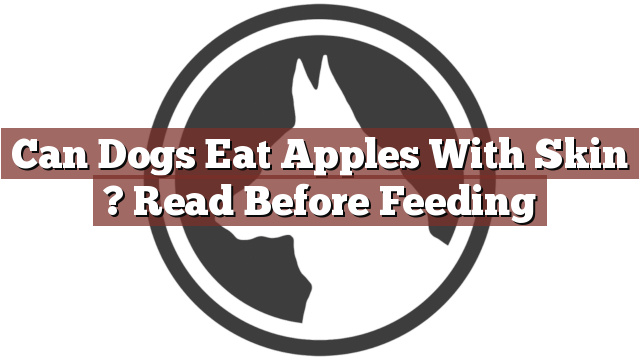Understanding Your Dog’s Dietary Needs
As a responsible pet owner, it is crucial to understand your dog’s dietary needs. While dogs are primarily carnivorous, they can also benefit from the inclusion of fruits and vegetables in their diet. However, not all fruits and vegetables are safe for dogs to consume. It is essential to research and educate yourself on what foods are suitable and which ones should be avoided to keep your furry friend healthy and happy.
Can Dogs Eat Apples With Skin? Read Before Feeding
Can dogs eat apples with skin? This is a common question among dog owners who want to introduce apples into their pets’ diet. The answer is a resounding yes. Apples, including the skin, can be a healthy and safe treat for your canine companion. Apples are a rich source of vitamins A and C, as well as dietary fiber. The skin of the apple contains antioxidants that can provide numerous health benefits to dogs.
Pros and Cons of Feeding Apples with Skin to Dogs
Feeding apples with skin to dogs offers several advantages. The skin of the apple contains fiber, which can aid in digestion and promote a healthy bowel movement. Additionally, the skin is rich in antioxidants that can help boost your dog’s immune system and reduce their risk of chronic diseases. Apples also have a crunchy texture, which can help in cleaning your dog’s teeth and freshening their breath.
However, it is important to note that while the skin of the apple is safe for dogs, the core and seeds should be avoided. Apple seeds contain a small amount of cyanide, which can be toxic to dogs if consumed in large quantities. Therefore, it is crucial to remove the core and seeds before feeding apples to your dog. Furthermore, it is recommended to slice the apple into smaller, bite-sized pieces to prevent choking hazards.
Conclusion: Apples with Skin – A Healthy and Safe Treat for Dogs
In conclusion, dogs can eat apples with skin. The skin of the apple provides essential nutrients and antioxidants that can benefit your furry friend’s overall health. However, it is crucial to remove the core and seeds, as they can be harmful to dogs. Additionally, it is advisable to slice the apple into smaller pieces to prevent any potential choking hazards. As with any new food, it is always a good idea to introduce apples gradually into your dog’s diet and monitor for any adverse reactions. Always consult your veterinarian before making any significant changes to your dog’s diet. With proper precautions, apples with skin can be a healthy and safe treat for your beloved canine companion.
Thank you for taking the time to read through our exploration of [page_title]. As every dog lover knows, our furry friends have unique dietary needs and responses, often varying from one canine to another. This is why it's paramount to approach any changes in their diet with caution and knowledge.
Before introducing any new treats or making alterations to your dog's diet based on our insights, it's crucial to consult with a veterinarian about [page_title]. Their expertise ensures that the choices you make are well-suited to your particular pet's health and well-being.
Even seemingly harmless foods can sometimes lead to allergic reactions or digestive issues, which is why monitoring your dog after introducing any new food item is essential.
The content provided here on [page_title] is crafted with care, thorough research, and a genuine love for dogs. Nevertheless, it serves as a general guideline and should not be considered a substitute for professional veterinary advice.
Always prioritize the expert insights of your veterinarian, and remember that the health and happiness of your furry companion come first.
May your journey with your pet continue to be filled with joy, love, and safe culinary adventures. Happy reading, and even happier snacking for your canine friend!

